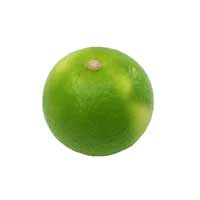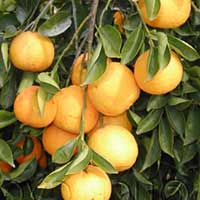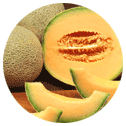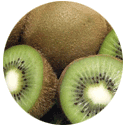 Full List of Fruits
Full List of Fruits  Kabosu Fruit
Kabosu FruitKabosu Fruit
Scientific name - Citrus sphaerocarpa
Kabosu is a citrus fruit from the family of Rutaceae. The fruit of this evergreen broad-leaf tree holds a special place in the hearts of Japanese people; they use it to enhance the flavor of the dishes made especially cooked fish, sashimi, and hot pot dishes. Sharing the same characteristics of a lemon, they are also used as vinegar. Very much related to Yuzu, this juicy fruit grows on a flowering shrub or tree which has very sharp thorns.
![]() Nutritional Value of Kabosu Fruit
Nutritional Value of Kabosu Fruit
| Vitamins | |
| Energy | 11 Cal |
| Protein | 0.18g (0.72 Cal) |
| Fat | 0.04g (0.36 Cal) |
| Vitamin A Retinol Equivalent | 0.44µg |
| Vitamin E Alpha Tocopherol | 0.04mg |
| Vitamin B1 | 0.01mg |
| Vitamin B2 | 0.01mg |
| Niacin | 0.04mg |
| Vitamin B6 | 0.01mg |
| Folate | 5.72µg |
| Pantothenic Acid | 0.07mg |
| Vitamin C | 18.48mg |
| Mineral | |
| Sodium | 0.44mg |
| Potassium | 61.6mg |
| Calcium | 3.08mg |
| Magnesium | 3.52mg |
| Phosphorus | 3.52mg |
| Iron | 0.04mg |
| Copper | 0.01mg |
| Manganese | 0.02mg |
| Total Dietary Fiber | 0.04g |
There are countless uses of the fruit, apart from used as an alternative to vinegar and marmalades, they are used as a substitute on fish for lemon; also used in soups. In addition, for decorative purposes as well! Dried peel of Kabosu are burnt and used as mosquito repellant. Bark and trees make a functional dooryard ornament. With a unique fragrance, the juice of Kabosu has a very sour flavor which is best used in products including condiments, juices, non-alcoholic beverages, frozen desserts, snack foods, wagashi, pastries, and alcoholic beverages.
![]() Health Benefits of Kabosu Fruit
Health Benefits of Kabosu Fruit
Kabosu fruit, a citrus fruit native to Japan, has been used for centuries in traditional Japanese medicine for its health-promoting properties. The fruit is packed with beneficial nutrients, and its health benefits range from aiding digestion, boosting immunity, and promoting cardiovascular health.
Kabosu is rich in antioxidants which can help reduce inflammation in the body and fight off diseases. It contains vitamins A, C, E, and K, all of which are essential for the body to function properly. Vitamin C is especially important for the health of the immune system, as it helps to fight off harmful bacteria and viruses.
Kabosu is also rich in minerals, including calcium, magnesium, potassium, and sodium. These minerals help to keep the body functioning optimally and can help reduce the risk of certain diseases. Potassium, for example, helps to regulate blood pressure and can help improve cardiovascular health.
Kabosu is also rich in dietary fiber, which helps to keep the digestive system healthy and can help improve the absorption of nutrients. Fiber can also help to reduce cholesterol levels in the body and can help to reduce the risk of developing certain types of cancer.
Kabosu can also help to reduce the risk of developing certain types of cancer. Studies have shown that the fruit contains compounds that can help to inhibit the growth of tumors. Additionally, studies have also shown that Kabosu can help to reduce the risk of certain types of diabetes, as it can help to regulate blood sugar levels.
Kabosu is also known to have anti-aging effects on the body. The high content of vitamin C helps to improve the production of collagen, which helps to keep the skin looking young and healthy. The antioxidants in Kabosu can also help to reduce the damage caused by free radicals, which can lead to premature aging.
Kabosu is also known to have anti-bacterial properties. Studies have shown that the fruit can help to fight off certain types of bacteria, such as E.coli and salmonella. This can help to reduce the risk of food poisoning and other bacterial infections.
Kabosu is also known to have anti-inflammatory properties. The antioxidants in the fruit can help to reduce inflammation in the body, which can help to reduce the risk of certain diseases. Additionally, the high content of vitamin C can help to reduce the risk of developing certain types of arthritis.
Overall, Kabosu is a nutrient-packed fruit that can provide many health benefits. It is rich in vitamins, minerals, antioxidants, and dietary fiber, which can all help to promote overall health and wellness. Additionally, it has anti-bacterial, anti-inflammatory, and anti-aging properties which can help to reduce the risk of certain diseases.
Kabosu was first propagated in the early 19th century in the Shikoku region of Japan. This area is known for its warm climate, which is ideal for the propagation of citrus fruits. The original Kabosu tree was found growing wild in the area and was propagated by grafting it onto other citrus trees.
Kabosu is propagated through a method called "budding". Buds are taken from the original tree and grafted onto a rootstock. The rootstock is a tree that is chosen for its disease resistance, hardiness, and other desirable characteristics. The grafted buds are then grown in a greenhouse until they are ready to be planted in the ground.
When planting Kabosu trees, it is important to choose a location that receives full sunlight and has well-drained soil. The trees should also be planted at least 8 meters apart, as the trees can grow to be quite large. It is also important to keep the soil evenly moist during the growing season.
Once the trees have been planted, they need to be pruned annually. This helps to promote healthy growth and encourage larger fruits. Also, the trees should be fertilized regularly to ensure that they get the necessary nutrients for healthy growth and production.
Kabosu trees typically take about three to five years to reach maturity and start producing fruit. The fruits are small and round and range from green to yellow in color. The fruits contain a large amount of juice, which is used to make Kabosu juice, a popular beverage in Japan.
Kabosu fruits can be harvested by hand or with the use of a machine. The fruits can be stored for several months and are often shipped to markets around the world.
Kabosu is an important part of the Japanese diet and culture. The fruit is used in many dishes, including sushi, salads, and cocktails. It is also used to make soaps and other beauty products. Kabosu is an important part of the Japanese agricultural industry and has become a popular export in recent years.


















